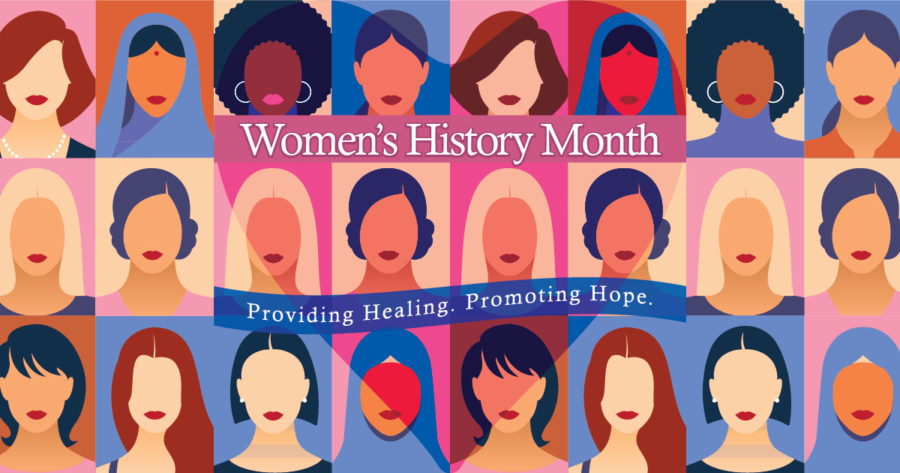Recognizing influential women for Women’s History Month
The theme for Women’s History Month 2022 is Providing Healing, Promoting Hope.
March 17, 2022
Since 1987, Women’s History Month has become a nationally recognized celebration of women’s achievements and contributions throughout history. According to the National Women’s History Alliance, the theme for Women’s History Month 2022 is about “Women providing healing, promoting hope.” This theme comes in response to the COVID-19 pandemic and recognizes the countless women that have provided healing and hope during this pandemic and throughout history. National Women’s History Month lasts all March, with International Women’s Day celebrated on March 8. A way to celebrate Women’s History Month is by telling the stories of influential women throughout history and recognizing their achievements to society. Marsha P. Johnson, Claudette Colvin, Rosalind Franklin, Wangari Maathai, Mary Coffin Ware Dennett and Mary Tape are some of the countless women who made extreme strides towards change and did not get their story told.
Marsha P. Johnson (1945-1992)
Marsha “Pay it No Mind” Johnson was a Black trans woman who devoted her life to fighting for LGBTQ+ rights and creating safe spaces for the homeless transgender youth of New York. Johnson found herself at Stonewall Inn, a popular gay bar of the time, on the morning of June 28, 1969, when the New York City police raided the bar and arrested 13 individuals. Fed up with police harassment and social discrimination, this incident sparked off the Stonewall riots, a series of protests in the area lasting five days. Johnson was on the front lines of these protests that helped spark progress towards the gay rights movement. A year after Stonewall, Johnson and Sylvia Rivera formed the Street Transvestite Action Revolutionaries (STAR). This group was devoted to providing food and shelter for transgender youth experiencing homelessness in New York City. Senior Anora Vang said, “Marsha Johnson is actually one of my favorite people in history, I really like her story.” Johnson’s legacy still lives on in the impacts she made towards the gay rights movement and the lives she protected.
Claudette Colvin (1939-)
Nine months before Rosa Parks refused to give up her bus seat in 1955, 15 year-old Claudette Colvin suffered a similar incident, though her name is not nearly as well known. On the bus home from school one day, the white section was full, and a white woman was left standing. The driver yelled for Colvin to give up her seat but she refused. She was roughly arrested and pulled off of the bus. Her bravery for not giving up her seat as a young Black woman set off a ripple effect for more people to speak up and protest the unfair rules of segregation. Colvin went on to become one of the plaintiffs in the federal case, Browder v Gayle, which ultimately led to the desegregation of Montgomery’s buses. Colvin is still alive and fighting against injustice to this day.
Rosalind Franklin (1920-1958)
Rosalind Franklin was a chemist who played a key role in discovering the molecular structures of DNA, RNA, viruses, coal and graphite. Franklin’s data was used to formulate Crick and Watson’s 1953 hypothesis on the structure of DNA. Franklin’s X-ray diffraction image that confirmed the helical structure of DNA was shown to Watson without her permission. The paper of Crick and Watson only slightly hinted at Franklin’s contributions to their hypothesis. Being a woman in a heavily male dominated workforce, Franklin was only given credit for her scientific contributions after she had died, and the work she did is often overlooked. In 1962, three men, Watson, Crick and Wilkens were awarded the Nobel Prize for discovering the spiraling ladder helix structure of DNA. Franklin did not receive any credit in this even though her picture was an important part of their discovery.
Wangari Maathai (1940-2011)
Wangari Maathai was a human rights activist, environmentalist and the first African woman to win a Nobel Peace Prize. Maathai founded the Green Belt Movement in 1977. The Green Belt Movement has planted over 51 million trees in Kenya and works internationally to promote fair and sustainable lifestyles. Professor Maathai was the first woman in east and central Africa to earn a doctorate degree. Maathai has earned numerous awards for her achievements in not only environmental change, but also activism for women’s rights and equality for all. Her most memorable award is The Nobel Peace Prize, she was awarded this prize in 2004 for her contributions to “sustainable development, democracy and peace.” Maathai’s achievements in her life help to inspire others to continue her fight against environmental degradation and poverty.
Mary Coffin Ware Dennett (1872-1947)
Mary Coffin Ware Dennett was an advocate for social reform in the early 1900s, she primarily fought for sex education and women’s rights to access contraception. During her time, not many people were educated on reproductive health, so she worked to spread education and end misinformation for women. With World War One, Dennett shifted her focus towards being an anti-war activist and fighting with the women’s suffrage movement. As the war progressed, she returned to birth control activism and became the executive secretary for the National Birth Control League in New York City, she later established the Voluntary Parenthood League in New York City. Dennett devoted her life to fighting the unfair censorship of the Comstock laws and even went to court fighting it in the case United States v. Dennett. Though the Comstock laws were not abolished in her lifetime and many conversations around birth control are still viewed as taboo in modern society, her fight is a key reason for the strides made towards the fair and accessible birth control that is more common today.
Mary Tape (1857-1934)
Mary Tape immigrated to the United States from China when she was a child. In 1884, Tape tried to enroll her daughter at a white public school. She was turned down because of her Chinese ancestry. Tape and her husband sued the school board for this in the case Tape v Hurley. Although they lost this case, their continued resistance towards the unfair rules of segregation in schools helped contribute towards the Chinese Exclusion Act being repealed in 1943. Tape’s family changed the way many Americans viewed Chinese-American families at the time, and opened a gateway for people of their race to be more accepted in their society. Mary Tape was one of the first Chinese-American desegregation activists of the time, and without her resisting the school, it may have taken longer for the Chinese Exclusion Act to be repealed.
Learn more at OHS
Students who are interested in learning more about women’s history should consider joining this week’s OHS Girls United meeting. They will be discussing influential women throughout history and learning more about the achievements of women. Girls United is a nonprofit organization run by girls and ally’s to inspire future generations of women. Owatonna Girls United Adviser Tara Lammers said, “It’s a great group of students. It’s open to anyone; male, female, non binary, we include everyone.” Girls United meets on Compass Wednesdays at 1:55 pm in room C-311 and all are welcome to join the organization or sit in on a meeting to learn more.







